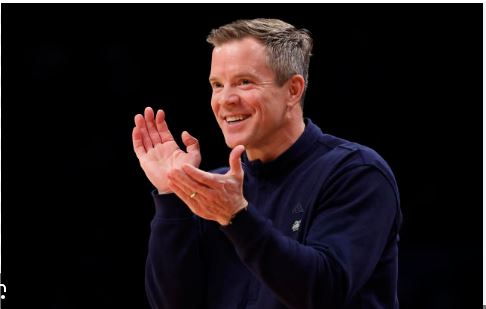
Following a terrible 8-24 season, the Michigan Wolverines knew something had to change. After the season finished the way it did, it was only a matter of time until Juwan Howard was thrown off the team.
The next big concern following Howard’s firing was who would take Howard’s slot on the squad. While a few possibilities were mentioned, the Wolverines ultimately chose Florida Atlantic’s Dusty May for the post.
The purchase is a significant step forward in May’s career, but what does it mean for the Wolverines?
Why was Dusty May appointed to lead the Michigan Wolverines?
May comes to the organization with a great basketball background. When the 57-year-old took over as head coach of his current squad in 2017, it was his first excursion into the role. While it took May some time to fully realize the program’s potential, his efforts have paid off during the last two years.
The Florida Atlantic Owls outgrew the CUSA in the 2022-23 season, finishing the season with a 35-4 record and making the Final Four seemingly out of nowhere. The good times continued when they moved to the AAC, finishing with a 25-9 record and a first-round exit in the 2024 edition of March Madness
While the team had outstanding contributors in Johnell Davis and Alijah Martin, it was clear that May’s coaching and recruiting helped the team make March Madness after a 21-year absence.
Analyst explains why the Wolverines’ decision to hire Dusty May is a great one
With the team performing well, it would have been difficult for May to leave for Michigan that’s known to have difficulty in finding quality players. The biggest hurdle for the men’s basketball team is the high academic requirements expected out of their athletes.
However, GBMWolverine’s Jordan Bruetsch claimed that the Wolverines were able to persuade May to quit the program he developed over six years due to the significant academic changes they are willing to make:
According to Jeff Goodman, Michigan promised May that it would be easy to recruit transfers into the program. That represents a significant departure for a school that has historically prioritized academics. However, it is congruent with the times. We are approaching a point where student athletes may be deemed university employees, so requiring them to adhere to the same strict academic standards as students would be counterproductive.
Making it easier for players to transfer in is quite important. Think about it. With fewer restrictions, this year’s Michigan basketball team would have included PAC-12 player of the year Caleb Love, who had committed to Michigan before admissions denied him, and Illinois All-American Terrance Shannon Jr. Hunter Dickinson is likely to stay with that squad. That’s a club that would be a national title contender.
With May’s experience at Florida Atlantic plus the tradition and resources available in Michigan, it’s not difficult to picture them becoming important on the national scene sooner than lather.
Leave a Reply